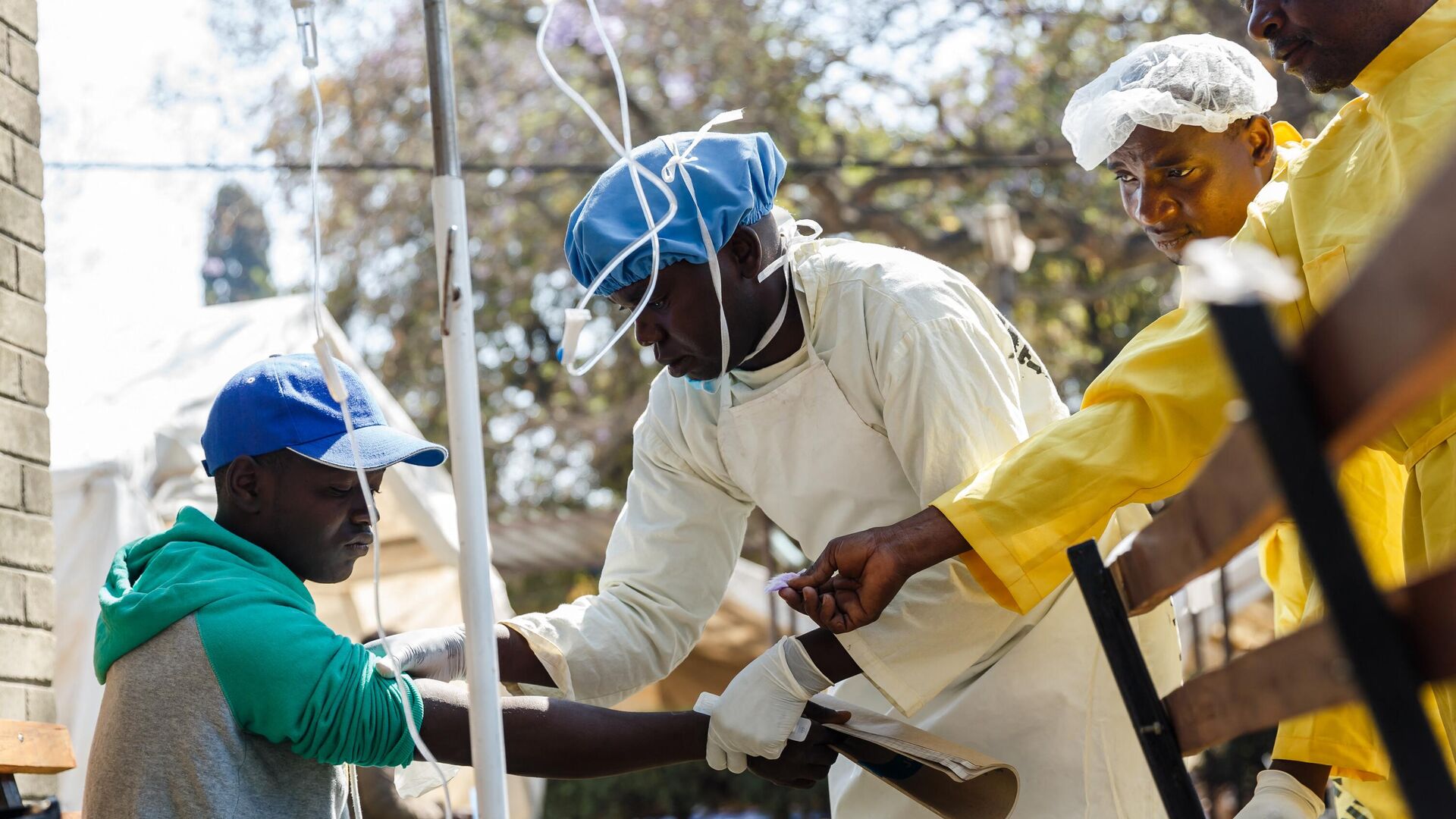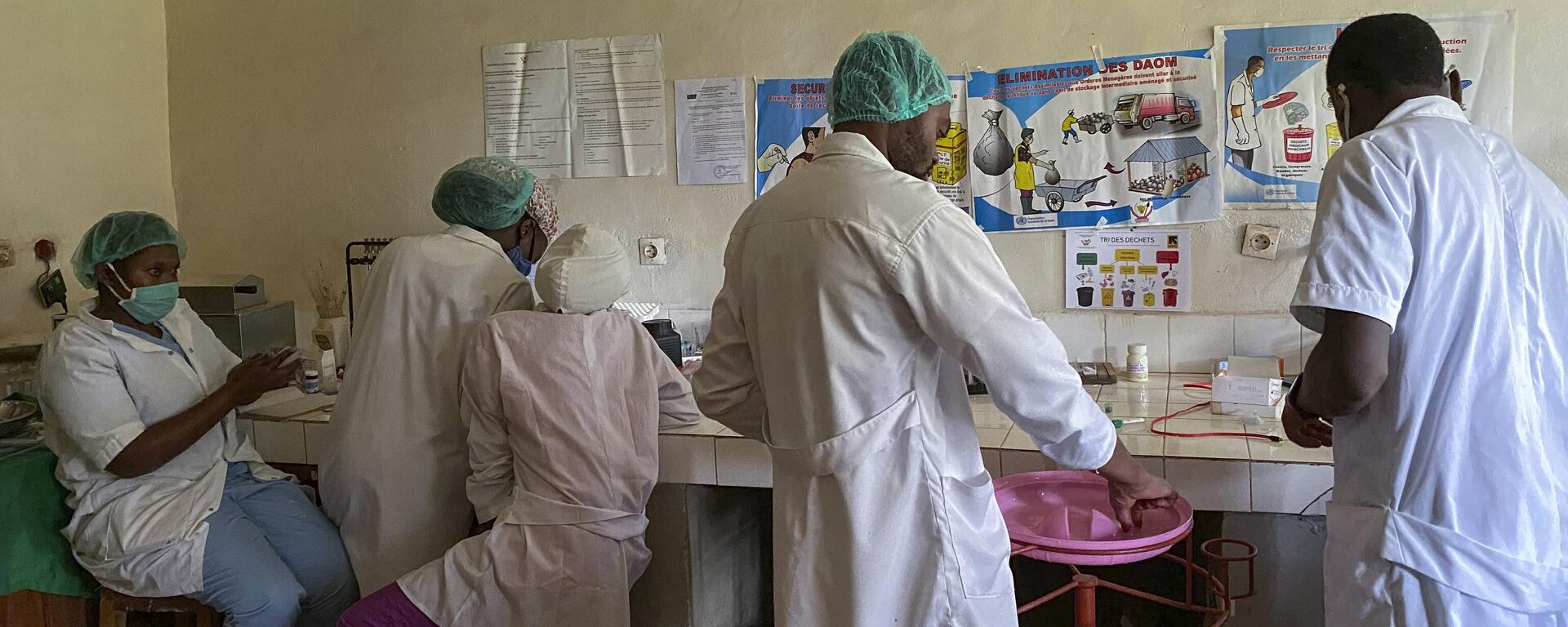https://en.sputniknews.africa/20231125/zimbabwe-reportedly-limits-public-gatherings-and-food-trading-due-to-surge-in-cholera-cases-1063788912.html
Zimbabwe Reportedly Limits Public Gatherings and Food Trading Due to Surge in Cholera Cases
Zimbabwe Reportedly Limits Public Gatherings and Food Trading Due to Surge in Cholera Cases
Sputnik Africa
Cholera is an acute infection caused by ingestion of contaminated food or water. It "remains a global threat to public health and an indicator of inequity and... 25.11.2023, Sputnik Africa
2023-11-25T18:19+0100
2023-11-25T18:19+0100
2023-11-25T18:19+0100
sub-saharan africa
zimbabwe
southern africa
cholera
world health organization (who)
united nations (un)
death
disease
https://cdn1.img.sputniknews.africa/img/07e7/0b/19/1063790533_0:0:3010:1694_1920x0_80_0_0_44a24eb4d256c2504b8ba0665eac50fc.jpg
Zimbabwe's government has begun restricting public gatherings and food trading while monitoring burials in all cholera-affected areas after a surge in cases this week, the media reported.This week, the number of new cases of cholera in the country in Southern Africa almost tripled from 437 to 1,259, according to the report, marking the largest increase since the water-borne disease's most recent outbreak began in February.As of Saturday, 8,787 instances of cholera have been recorded in the nation, with 155 deaths associated with it.Due to the biggest number of new infections, authorities of the Zimbabwe's capital, Harare, reportedly declared a state of emergency last week.In May, Harare Health Council Chief Prosper Chonzi confirmed a cholera outbreak in Zimbabwe's capital after 21 cases were reported.In October, the government introduced some other restrictions. For instance, funerals were limited to 50 people and neither handshakes nor food service was permitted during the gatherings. Additionally, authorities advised staying away from unlicensed vendors, outdoor church camps with poor hygiene, and open-air markets.Furthermore, media reported that Zimbabweans were finding it more and more difficult to access clean water and water purification supplies. Some locals were also worried about the diminishing security of boreholes.However, on Saturday, Harare's Mayor Lovejoy Chitengu assured residents that the capital's water is "the safest". To confirm his words, he drank water from the tap in one of the city's districts.Besides that, residents in Harare have reportedly been receiving water purification tablets from the city government as part of their efforts to combat the diarrheal illness.In 2008, a cholera outbreak in Zimbabwe killed more than 4,000 people before the United Nations and the US Agency for International Development intervened to bring the deadly infection under control.
https://en.sputniknews.africa/20231028/this-african-country-struggles-with-worlds-largest-cholera-epidemic-according-to-who-1063133631.html
zimbabwe
southern africa
Sputnik Africa
feedback@sputniknews.com
+74956456601
MIA „Rossiya Segodnya“
2023
Christina Glazkova
https://cdn1.img.sputniknews.africa/img/07e7/0b/07/1063380906_0:0:673:674_100x100_80_0_0_79628b4d0cd9f29291a57aa13bbf9e7a.jpg
Christina Glazkova
https://cdn1.img.sputniknews.africa/img/07e7/0b/07/1063380906_0:0:673:674_100x100_80_0_0_79628b4d0cd9f29291a57aa13bbf9e7a.jpg
News
en_EN
Sputnik Africa
feedback@sputniknews.com
+74956456601
MIA „Rossiya Segodnya“
Sputnik Africa
feedback@sputniknews.com
+74956456601
MIA „Rossiya Segodnya“
Christina Glazkova
https://cdn1.img.sputniknews.africa/img/07e7/0b/07/1063380906_0:0:673:674_100x100_80_0_0_79628b4d0cd9f29291a57aa13bbf9e7a.jpg
zimbabwe, southern africa, cholera, world health organization (who), united nations (un), death, disease
zimbabwe, southern africa, cholera, world health organization (who), united nations (un), death, disease
Zimbabwe Reportedly Limits Public Gatherings and Food Trading Due to Surge in Cholera Cases
Christina Glazkova
Writer / Editor
Cholera is an acute infection caused by ingestion of contaminated food or water. It "remains a global threat to public health and an indicator of inequity and lack of social development," according to the WHO. Cholera can kill within hours if left untreated.
Zimbabwe's government has begun restricting public gatherings and food trading while monitoring burials in all cholera-affected areas after a surge in cases this week, the media reported.
This week, the number of new cases of cholera in the country in
Southern Africa almost tripled from 437 to 1,259, according to the report, marking the largest increase since the water-borne disease's most recent outbreak began in February.
As of Saturday, 8,787 instances of cholera have been recorded in the nation, with 155 deaths associated with it.
Due to the biggest number of new infections, authorities of the Zimbabwe's capital, Harare, reportedly
declared a state of emergency last week.
In May, Harare Health Council Chief Prosper Chonzi confirmed a
cholera outbreak in Zimbabwe's capital after 21 cases were reported.
In October, the government
introduced some other restrictions. For instance, funerals were limited to 50 people and neither handshakes nor food service was permitted during the gatherings. Additionally, authorities advised staying away from unlicensed vendors, outdoor church camps with poor hygiene, and open-air markets.
Furthermore, media reported that Zimbabweans were finding it more and more difficult to access clean water and water purification supplies. Some locals were also worried about the diminishing security of boreholes.
However, on Saturday, Harare's Mayor Lovejoy Chitengu
assured residents that the capital's water is "the safest". To confirm his words, he drank water from the tap in one of the city's districts.
Besides that, residents in Harare have reportedly been receiving water purification tablets from the city government as part of their efforts to combat the diarrheal illness.
In 2008, a cholera outbreak in Zimbabwe killed
more than 4,000 people before the United Nations and the US Agency for International Development intervened to bring the deadly infection under control.



